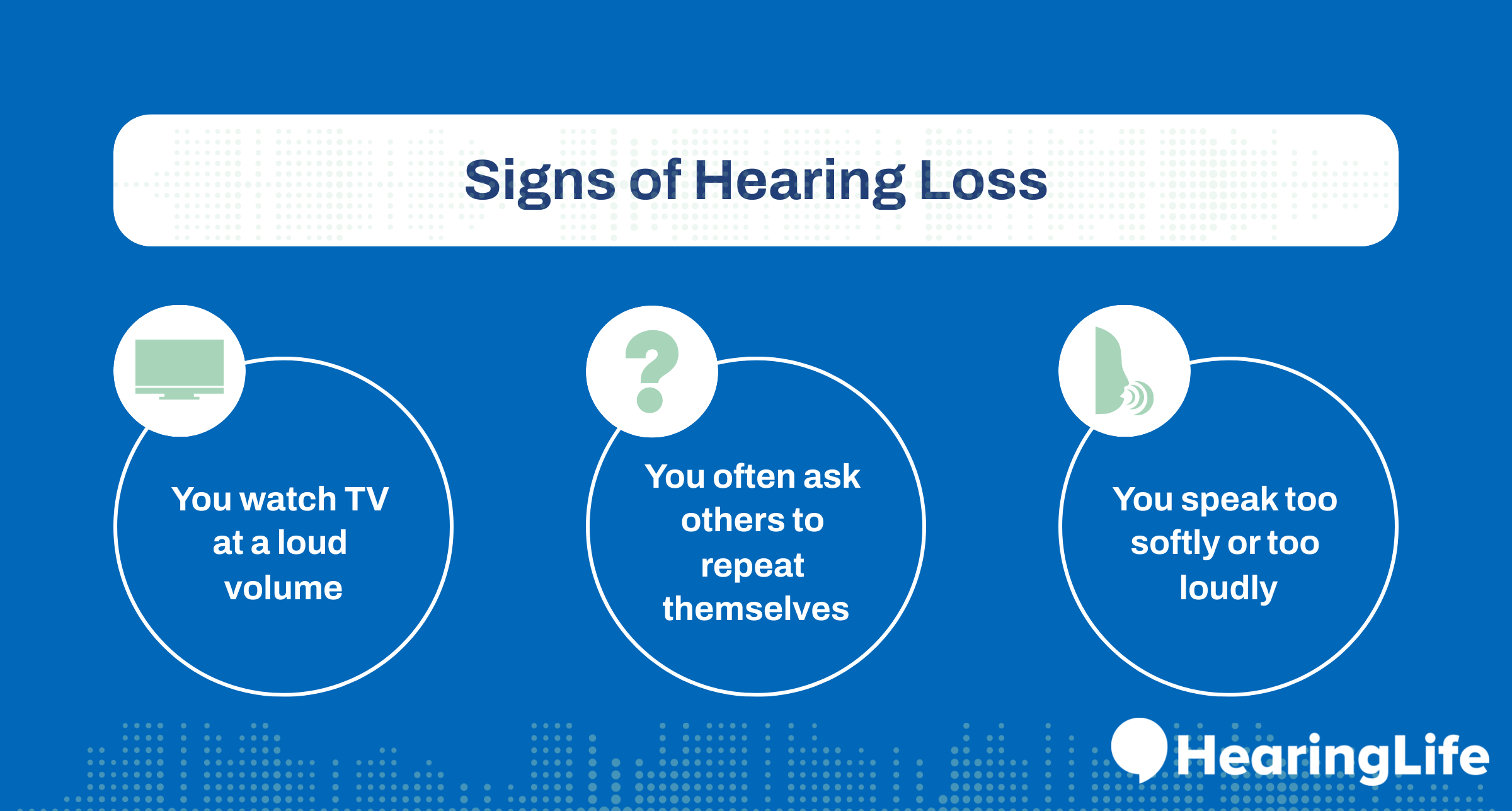
Signs and symptoms of hearing loss
How to recognize the signs of hearing loss and how to act on them.
Overview
- Signs of hearing loss include listening to loud television and often asking others to repeat themselves.
- Symptoms of hearing loss include difficulty following conversations, often hearing people mumbling, and tinnitus.
- Get a hearing test for an official hearing loss diagnosis and explore your treatment options.
What are the signs of hearing loss?
Hearing loss is usually a gradual decline; gradual changes in your hearing are hard to notice. Often, loved ones are the first to mention your loss of hearing because they speak to you the most. They’ll notice a difference in your behaviour.

Here are some common signs:
-
You watch the TV at a loud volume
Do your family or friends complain that the TV is too loud? If you find yourself constantly increasing the volume to understand dialogue, it could be a sign that your hearing has changed.
-
You often ask others to repeat themselves
Everyone mishears sometimes, but if you regularly ask others to repeat themselves, often to the point of frustration, it may be time to get your hearing checked.
-
You speak too softly or too loudly
With a hearing impairment, your perception of sound can change. Others may complain that you are shouting at them, or that your voice is too low while you perceive your voice to be at a normal volume.
Signs of hearing loss can vary based on the type of hearing loss you have:
Signs of sensorineural hearing loss
- Difficulty following conversations involving more than two people
- Difficulty following conversation when there’s background noise
- Difficulty understanding phone conversations
- Sounds seem unclear or people sound like they are mumbling
- Difficulty hearing high-pitched sounds
- Ringing or buzzing in the ears, called tinnitus
Signs of conductive hearing loss
- Speech and other sounds seem distant or muffled
- Pain, pressure in or discharge from the ear
- A feeling of “fullness” in the ear
- Decrease in the volume of the sounds (but the sounds are not distorted)
Signs of sudden hearing loss
- Unexplained rapid loss of hearing
- Loss of hearing all at once or over a couple of days
- It is almost always experienced in one ear only
- It can go away by itself, or be reversed by medical treatment
- Vertigo
| Sudden hearing loss: Seek help immediately If you experience sudden hearing loss, you should seek medical attention immediately! It is more likely that you will regain some of your hearing back if you treat this type of hearing loss within the first 72 hours. |
Common symptoms of hearing loss
If any of the following situations are familiar, it may be time to check your hearing:
1. Difficulty following conversations
Do you find it challenging to follow conversations in noisy places, like restaurants or family gatherings? If group discussions leave you feeling lost or exhausted from trying to keep up, your hearing could be the reason.
2. Phone conversations are unclear
Whether you’re chatting with a loved one or taking an important call, voices on the other end may sound unclear or distant—especially in quiet settings or when there’s background noise.
3. People seem to be mumbling
If you often ask others to repeat themselves or feel like people aren't speaking clearly, it may not be them—it may be your hearing. When certain sounds become harder to distinguish, speech can start to sound muffled or unclear.
4. Difficulty locating sounds
Have you ever heard your name but weren’t sure who called you? Or struggled to figure out where a noise—like a ringing phone or honking car—is coming from? Difficulty locating sounds can be another sign of hearing loss.
5. Ringing or buzzing in your ears
A persistent ringing, buzzing, or hissing sound in your ears (called tinnitus) can be linked to hearing loss. It can be distracting, especially in quiet environments, and may interfere with focus or sleep.
Recognizing these signs early can make a big difference. If any of these sound familiar, consider getting your hearing checked—it’s quick, easy, and can help you stay connected to the world around you.
Levels of hearing loss
Hearing loss can be categorized by severity level. Your level of hearing ability is measured in decibels (dB), referring to how loud sounds need to be for you to hear them.
Hearing loss levels

Early recognition may improve your quality of life
Seek treatment as soon as you recognize any early signs of hearing loss. This can reduce your risk of experiencing these consequences of untreated hearing loss:
- Missing out on conversations with loved ones, friends, and colleagues each day
- Feeling left out or unable to hear in social environments
- Feelings of isolation or depression

